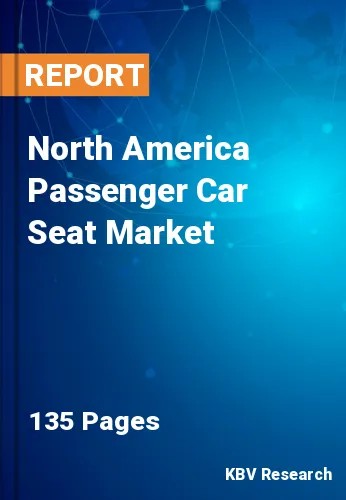The North America Passenger Car Seat Market would witness market growth of 1.6% CAGR during the forecast period (2023-2030).
The main objective of the seating system is to facilitate passengers and ensure their comfort. OEMs and tier 1 manufacturers exert great effort to meet consumer demands for increased comfort and opulence as this demand increases. The seating system also plays a vital role in passenger safety. Airbags are integrated into the seating, necessitating seamless seat operation.
In addition, these seats give a vehicle a fashionable appearance because they can accommodate a variety of interior components and fabric types. In addition, automotive seats are regarded as one of the most critical vehicle components because they are designed to support the quadriceps, buttocks, lower and upper back, and head. Typically, they are made of steel, aluminum, or composite material. The increasing passenger, electric, and commercial vehicle sales are one of the primary factors propelling the market share.
During the forecast period, factors such as the increase in sales of luxury vehicles in developing nations, the demand for climate-controlled seat technology, and the demand for lightweight seat frameworks are anticipated to drive the growth of the market. In addition, an increase in passenger vehicle sales due to the improved lifestyles of middle-class families, a rise in disposable income, and a surge in demand for feature-enabled advanced seats are expected to fuel the market's expansion.
The United States has one of the world's most significant automobile markets. The United States is the second-largest market for vehicle sales and production globally. Additionally, the automotive industry is a leader in innovation. Passenger vehicle imports in Canada increased by approximately 26% to $27.8 billion in 2021, approaching pre-pandemic levels. Mexico is a significant market for American passenger vehicles. Audi, BMW, Baic Group, Stellantis (made up of FCA and PSA Group), Ford, Honda, General Motors, Hyundai, Jac by Giant Motors, Kia, Mazda, Mercedes-Benz, Nissan, Toyota, and Volkswagen have established automakers in Mexico. The thriving automotive industry's considerable passenger sales will create additional growth opportunities for the regional market.
The US market dominated the North America Passenger Car Seat Market by Country in 2022, and would continue to be a dominant market till 2030; thereby, achieving a market value of $9.4 billion by 2030. The Canada market is poised to grow at a CAGR of 3.9% during (2023 - 2030). Additionally, The Mexico market would witness a CAGR of 3% during (2023 - 2030).
Based on Seat Type, the market is segmented into Bucket, and Split/Bench. Based on Technology, the market is segmented into Powered Seats, Standard Seats, Heated Seats, Powered, Heated & Memory seats, Powered, Heated & ventilated seats, Powered, Heated, & Memory Seats, and Powered, Heated, Ventilated, Massage, & Memory Seats. Based on Trim Material, the market is segmented into Synthetic Leather, Genuine Leather, and Fabric & Foam. Based on Component Type, the market is segmented into Seat Belt, Seat Frame & Structure, Armrest, Pneumatic System, Seat Headrest, Side/Curtain Airbag, Seat Headrest, Seat Recliner & Height Adjuster, and Others. Based on countries, the market is segmented into U.S., Mexico, Canada, and Rest of North America.
Free Valuable Insights: The Worldwide Passenger Car Seat Market is Projected to reach USD 47.3 Billion by 2030, at a CAGR of 1.8%
The market research report covers the analysis of key stake holders of the market. Key companies profiled in the report include Adient plc, Faurecia (Groupe PSA), Lear Corporation, Aisin Corporation (Toyota Motor Corporation), Magna International, Inc., TS TECH Co., Ltd., Johnson Controls International PLC, NHK Spring Co., Ltd, TACHI-S CO., LTD., Gentherm Incorporated
By Seat Type
By Technology
By Trim Material
By Component Type
By Country
Our team of dedicated experts can provide you with attractive expansion opportunities for your business.

